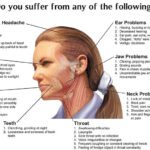Temporomandibular Joint Disorder (TMJ) is a set of medical conditions that affect the lower jaw, its muscles, and the joints that encompass it. The side effects may range from severe to mild, yet new researches have associated TMJ to extra side effects that had been unexplainable in several patients until recently.
OVERVIEW OF TMJ DISORDER
The temporomandibular joint joins the lower jaw to the temporal bones of the skull, and the muscles encompassing this joint are utilized to close and open the jaw and control its spot from side to side. For the movements that are complex, the TMJ is responsible.
Unlike the majority of a medical disorder, TMJ is not just one disorder but a set of similar disorders that affect the temporomandibular joint. Most of the particular conditions that are considered TMJ can be categorized as one of the following three categories; however, patients can also suffer from more than one kind at the same time:
Arthritic TMJ
When the swelling related to arthritis create problem in the lower jaw joints, it can lead to discomfort and pain in the joint and the encompassing muscles
Myofascial Pain Disorder
This one incorporates the most regularly experienced TMJ issue and is differentiated by discomfort and pain in the jaw, head, and neck.
Derangement in TMJ Internally
Derangement internally is the most severe type of TMJ dysfunction. A displaced jaw or trauma, among different other causes, may precipitate the situation.
TMJ SYMPTOMS
TMJ may lead to at least one side effect, however, the most common is pain and uneasiness in the lower jaw, which might range from mildly irritating to extremely disturbing. Other symptoms that common are as follows:
- A headache
- Neck pain
- Ear pain
- Stiffness in the lower jaw
- Locked jaw or trouble moving the jaw
- Teeth Gritting, clicking and/or popping sounds while closing or opening the jaw
- Lower and upper jaw misalignment
- Ears Ringing
NON-INVASIVE TREATMENT FOR TMJ
Several instances of TMJ can be dealt with noninvasive strategies, huge numbers of which can be performed by patients at home with a specialist’s suggestion. These self-care strategies include:
- Putting ice packs to jaw
- Eating only soft food
- Restricting jaw movement
- Doing stress-reducing and relaxing activities
- Engaging in jaw exercises
Other noninvasive therapies are there but generally need a prescription or the assistance of a dentist. These treatments consist of anti-inflammatory & pain-relief prescription medicines.
INVASIVE TREATMENT FOR TMJ
If noninvasive treatments fail, surgery might be necessary for the TMJ treatment. Various procedures are there that help ease serious disorders in a lot of patients. In serious cases, artificial joint implants are done.
TMJ is normally not serious. For the majority of people, the symptoms linked with TMJ can be settled by following a prescribed treatment program. For some, TMJ goes away on its own without any doctor visit. If the root cause is a misaligned bite or injured jaw joint, dental methods or surgery may be required.









